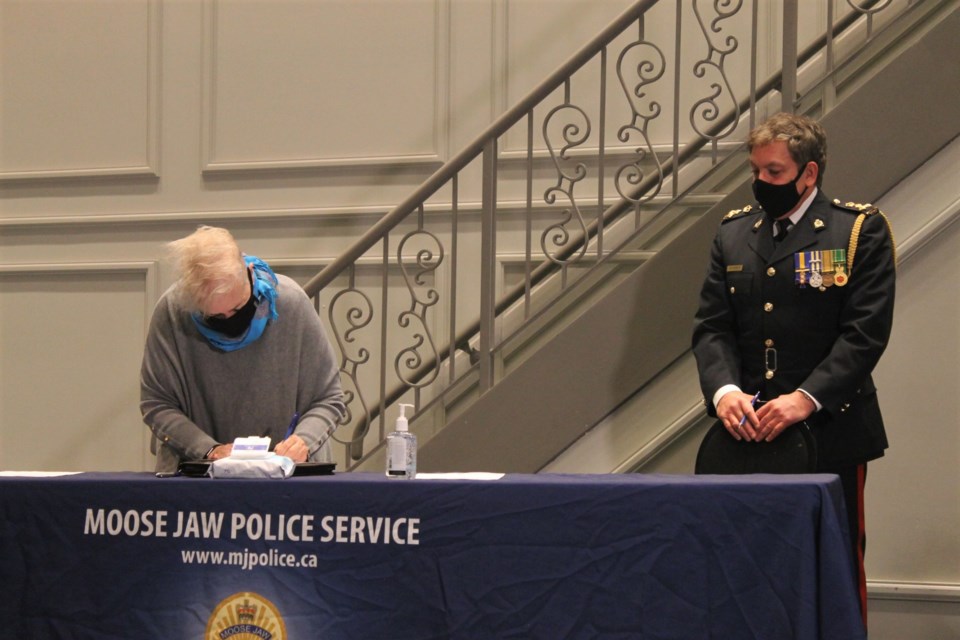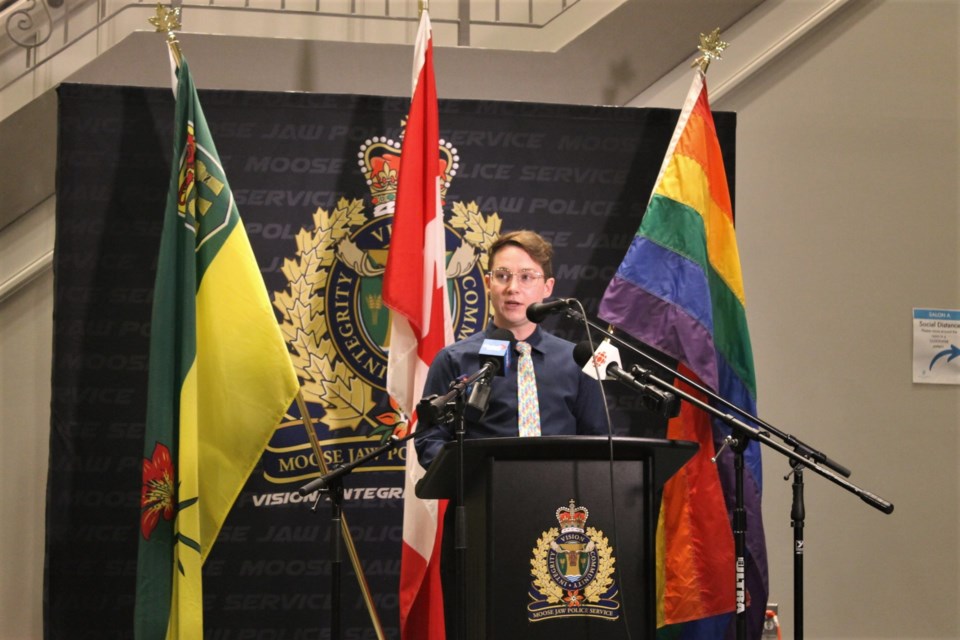Chief Rick Bourassa of the Moose Jaw Police Service (MJPS) issued a public statement of apology to the entire LGBTQ+ community in Moose Jaw on Tuesday, in a press conference held live in partnership with Moose Jaw Pride.
Bourassa’s statement included an admittance of past and recent mistreatments that LGBTQ+ individuals have experienced in Moose Jaw, and issued an apology on behalf of the MJPS for any conduct that left individuals feeling unprotected by police.
“Everybody individually is equal before and under the law and has the right to equal protection and equal benefit of the law, [and] the planning circle [with Moose Jaw Pride] tells us we haven’t lived up to these principles. We haven’t been there. We haven’t protected everyone. We haven’t been as inclusive as we should be to LGBTQ+ people and families in our community,” said Bourassa. “We can’t change the past but we can learn from the past and work in the present to shape the future, a future in which we are all protected, we are all connected, and the police are truly everyone’s police.”
Moose Jaw Pride Responds
Moose Jaw Pride representative Cole Ramsey, whose pronouns are they and them, provided a response to the apology from the MJPS.
“Today, Chief Bourassa and the Moose Jaw Police Service have acknowledged responsibility for their part in the harm that has been done to 2SLGBTQ people. It is a significant step towards change, thank you, but this apology is also only one of many steps along the path towards doing better,” said Ramsey.
Ramsey added that they are not accepting the apology on behalf of the LGBTQ+ community, but rather acknowledging the gesture and committing to a working partnership for improvement moving forward.
“I think that many people will be ready to receive this positively, to understand that this is something that has a lot of thoughtful work and money into it and there is sincerity behind it,” said Ramsey. “For other people who may not be ready to accept an apology, who may still be grappling with forgiveness for the things that have been done to them or they’ve experienced, all we can do is try to support them along that path.”
MJPS and Moose Jaw Pride have been working together for more than a year, said Ramsey, with a planning circle listening to LGBTQ+ voices about their experiences with police to help shape the MJPS and its policies moving forward.
Ramsey said that stories of incidents from as long ago as 30 years and as recent as this year have come to light during that process, highlighting the need for continued efforts to improve police conduct.
“We heard from people that many were not willing to report harm done to them if it meant disclosing their sexuality or gender identity to police, which is obviously something that needs to change. It's a sign that something is wrong in the system,” said Ramsey.
“Part of the work we're doing is making sure that people feel safe with their police service, the people who are supposed to protect them. If nothing else, a lot of the work we’ve been doing is to visibly repair a relationship that has historically been fractured,” they continued. “There are people in the community who’ve experienced a great deal of harm and neglect over the decades, so it is important for this to happen because people are still living with that trauma.”
 Moose Jaw Pride chair Kelly Carty (L) and Moose Jaw Police Service Cheif Rick Bourassa signed a statement of commitment during the conference.
Moose Jaw Pride chair Kelly Carty (L) and Moose Jaw Police Service Cheif Rick Bourassa signed a statement of commitment during the conference.MJPS and Moose Jaw Pride Sign a Letter of Committment
The MJPS chief went on to emphasize that moving forward, the police force will be developing its member training and policies using the partnership with Moose Jaw Pride, to include LGBTQ+ perspectives and input.
“This is an ongoing piece of work that has been happening, and it includes training our members to ensure that our people understand what the issues are, how we create trust, how we can provide service to people at their point of need,” said Bourassa.
Bourassa signed a letter of commitment alongside Moose Jaw Pride chair Kelly Carty as a symbol of the two agencies’ commitment to continue working together to improve the experience of LGBTQ+ individuals in the community.
“Moose Jaw Pride is in part an advocacy and outreach organization, and so with our partnership with Moose Jaw Police Service, we’re better able to fulfil that advocacy on behalf of those who need that support or experience harm in this community and need to seek justice,” said Ramsey.
Both Bourassa and Ramsey admitted that while the gesture appears largely symbolic, the two agencies hope it offers a more solidified promise to the LGBTQ+ members of the community for the future.
“We are going to take the lead [in the community] and continue moving forward, as we should,” said Bourassa.
“We are going to continue to see that education and outreach into the future. We will build on the relationship with MJPS to develop better practices and advocate for broader change in our justice systems,” said Ramsey.




